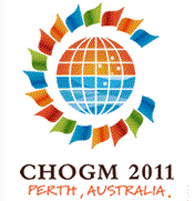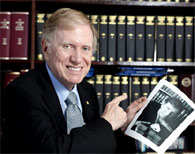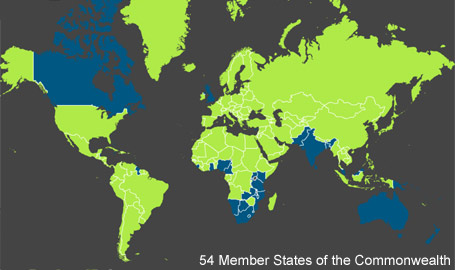Retired Australian High Court judge Michael Kirby, and Foreign Minster Kevin Rudd will call for an end to laws criminalising homosexuality at the Commonwealth Heads of Government Meeting (CHOGM) in Perth from 28 to 30 October 2011.


More than 2 billion people - over half of them under 30 years old - living in the Commonwealth, representing around 30 percent of the world's population and over a quarter of the world's countries.
More than 2 billion people - over half of them under 30 years old - living in the Commonwealth, representing around 30 percent of the world's population and over a quarter of the world's countries.
Forty-one of the 54 Commonwealth countries including Malaysia, Singapore, Bangladesh, Brunei, Pakistan, Maldives, 17 of the 19 African Commonwealth nations except South Africa and Rwanda and all Commonwealth Caribbean countries except The Bahamas still have anti-gay laws on their statute books, often as a legacy of British colonial rule. In Sri Lanka, section 377 was changed in 1995 to extend the offence from not just men but also to women.
"It's just a dear little legacy of the British Empire," Kirby, an openly gay retired High Court judge and Australia's representative on the 11-member Eminent Persons Group (EPG), said ahead of the meeting. The Chairperson of the group is former Prime Minister of Malaysia Tun Abdullah Ahmad Badawi.
"It's a very special British problem.
"And the problem is it makes it very difficult to get messages about HIV out," he said in comments broadcast on the ABC.
It reported that while about 2.7 million new people become infected with HIV every year, the virus claiming a further two million lives annually. Commonwealth countries are disproportionately burdened with the disease, accounting for some 30% of the global population, but 60% of the world's HIV/AIDS cases.
Kirby noted that reforms would face cultural and religious obstacles among members of the Commonwealth.
"But you need to remove the criminal laws, and that is what the Eminent Persons Group is suggesting for the CHOGM meeting," he said.
When contacted by Fridae, Kirby confirmed that the report from the EPG has been presented to the Secretary General of the Commonwealth of Nations (Mr Kamalesh Sharma) and is part of the formal CHOGM agenda. However, the report will not be released until it has been seen and considered by the current Commonwealth leaders in Perth.
A number of media reports in Canada and the UK suggest that several Commonwealth member nations have acted to delay its release. The report is said to contain some 106 recommendations aimed at giving the group a more active role in monitoring human rights in member countries. The UK Telegraph warns that the recommendation calling for the repeal of laws prohibiting homosexuality could trigger a high-level row.
During the 16th Commonwealth Law Conference in Hong Kong in 2009, Justice Kirby made a strong plea that homosexual law reform be addressed within the Commonwealth: “Whilst issues of principle and the fundamental policy of the criminal law are at stake, and these must not be confused with utilitarian reasons concerning national responses to AIDS, the fact remains that the current approaches, particularly in Commonwealth countries in Africa, Asia and the Caribbean, place an impediment in the way of effectively tackling this major epidemic. Criminalise people and you cannot reach out to their minds and effectively influence their conduct. (…) that message is now one of great importance for the Commonwealth of Nations where AIDS is definitely a priority issue.”

